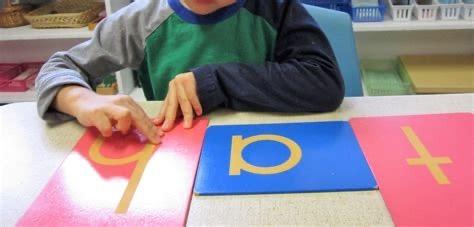
Dyslexia is a learning disorder that affects the ability to read, write, spell, and comprehend words. While a variety of methods exist to help children with dyslexia, Montessori education offers a unique approach that can provide the structure and support needed for these children to succeed.
This blog post explores how Montessori education benefits children with dyslexia and discusses the key components that make this approach successful.
Focuses on a Multisensory Approach
The Montessori approach is highly individualized and focuses on a multisensory approach to learning. The curriculum uses visual, auditory, and tactile activities to engage students as they learn. This way, children with dyslexia can access the material through multiple senses, which can help them better understand and retain the information.
For example, a Montessori teacher may have students use Sandpaper Letters to practice letter formation. The tactile activity allows the student to feel the shape of each letter, which reinforces the concept of letter formation. Dyslexic children can benefit from this approach as they can connect the visual and the tactile.
Similarly, the Montessori approach uses music and movement to help dyslexic students strengthen their phonemic awareness skills. The students can engage in rhythmic activities and sing songs to help them learn the letter names and sounds. This multisensory approach offers a unique way for dyslexic children to make connections between visual and auditory information.
Though dyslexia is a lifelong condition, dyslexic children who attend a Montessori school are more likely to develop better reading and writing skills due to this approach.
Teaches Children to Completely Engage With Material
Rather than give students worksheets to complete, a Montessori teacher guides the children through activities to help them build a deeper understanding of what they learn. This hands-on approach gives dyslexic children the opportunity to explore the material in a concrete and meaningful way.
For example, a Montessori teacher may have students sort objects into categories. This simple activity helps the student understand how to classify objects and recognize patterns.
Dyslexic children can benefit from this approach as they get a chance to explore the material on their own terms and develop crucial problem-solving skills. Rather than memorize facts, dyslexic students can take the time to think critically about the material as they work through each activity and find solutions.
This approach also helps dyslexic children build self-confidence as they master the material. The teacher is there to guide them and encourage them to take all the time they need to understand the concept rather than rush through the material.
Uses Task-based Learning and Self-directed Exploration
The Montessori approach uses task-based learning and self-directed exploration to help children develop their reading and writing skills. Students can choose their own activities, which allows them to explore topics that interest them.
For example, a Montessori teacher may have students work on a project that requires them to research a particular topic in depth. The teacher will guide the student in their research and help them write, read, and think critically about the material. As the student works through the project, they learn to read and write in an engaging way.
Dyslexic children can benefit from this approach, as they are able to explore topics that interest them even as they learn to read and write. This self-directed exploration helps them develop their skills more quickly, which leads to better results.
Finally, Montessori education gives dyslexic children the opportunity to engage with their peers in meaningful ways. During specific sessions, a Montessori teacher may have students pair up and work together on projects.
The hands-on approach encourages dyslexic children to work together with their peers, which helps them develop social skills. This type of collaboration is essential for those dyslexic students who struggle with communication and verbal interactions.
At Miniapple International Montessori School, we believe in the power of Montessori education to help dyslexic children develop into confident, successful learners. Our teachers offer a nurturing and supportive environment that encourages children to explore their interests and discover their potential. Contact us today to learn more about how Montessori education can help your child succeed.

